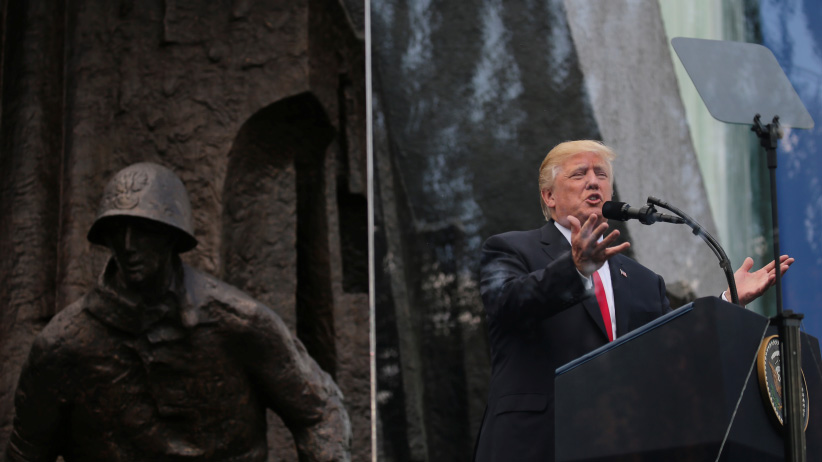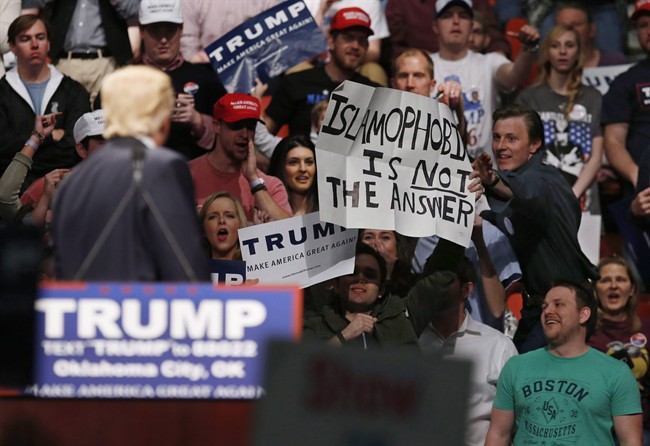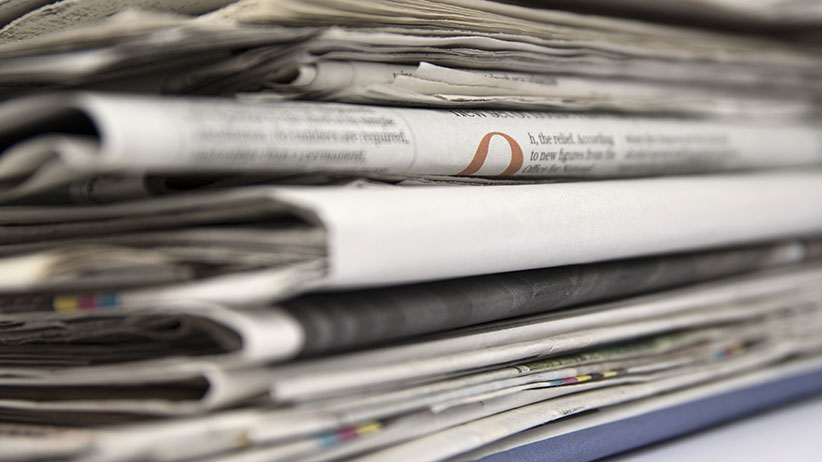Donald Trump is making America consider what greatness really means
Polls suggest Americans are reflecting on their values, says Bruce Anderson—inadvertently giving Trump the consequential presidency he sought
U.S. President Donald Trump gives a public speech in front of the Warsaw Uprising Monument at Krasinski Square in Warsaw, Poland July 6, 2017. (Carlos Barria/Reuters)
Share

Donald Trump was a most unconventional candidate when millions were desperate for a break from the conventional. Maybe, they hoped, his rough edges would be just what a political system calcified by convention needed.
And Trump himself was determined to be the most consequential president ever: He promised to be a president who would matter, who would shake things up. His biggest boast, emblazoned on his trademark trucker cap, was that he would “make America great again.”
But he’s not. Instead, he is making America recoil, and forcing it to give more thought to what greatness truly looks and sounds like.
In ways he didn’t intend, not six months into his term, the 71-year-old political novice may already be the most consequential president in a long, long time: He’s made Americans, and many in the world at large, consider the values they hold dear.
America in the world
U.S. politicians routinely unquestioningly refer to America as “the greatest nation on earth” as though it’s a birthright—something God gave, and Americans received.
But something’s different now. Even as Trump boasts that he is righting the ship, he has put America on a path of embarrassment in the world, and anxiety at home. Across the 37 countries surveyed by the Pew Research Centre, America’s image has suffered a brutal decline: 64 per cent had confidence in Obama, while only 22 per cent said the same thing about Trump. Favourable opinion of the U.S. has slid from 64 per cent to 49 per cent. Only in Russia and Israel is Trump seen as better than Obama.
Trump said he’d put China in its place. No longer, he vowed, would China undermine America’s leadership. But the opposite is happening: China is embracing the challenge to fight climate change, campaigning for open trade relations, and listening to, not insulting, the rest of the world. China’s not perfect, but Trump’s America is making China’s imperfections seem modest and shrinking. And in response, American opinion of China has improved 7 points in the last year, according to Pew.
Trump the candidate mused about getting along with Russia. But within three months of Trump’s inauguration, the Kremlin said relations with the U.S. were worse than at any point since the Cold War, and Trump said “we’re not getting along at all.” It’s unlikely that the various investigations of Russian meddling and possible collusion are going to improve things. Putin got the president he wanted, and Trump has made America worry about Russia again.
Trump’s characteristically poorly informed, chippy attitude to NATO has also backfired. America’s partners decided not bow to his will, but have begun to imagine a NATO that depends less on the United States. For an organization set up to help protect Americans, this hardly counts as “winning.”

Race and nationalism
Trump’s campaign featured barely veiled racism towards Mexicans and Muslims, and calculated indifference to concerns of “the blacks.” In the way that he talked about Brexit, or the French election, or defending America’s own borders, Trump became, seemingly wittingly, the hero of bigots around the globe, who saw him as legitimizing dark thoughts on social media, supporting xenophobic far-right political goals, and deriding “political correctness.”
Racists may have seen Trump’s election as a momentum builder. While it’s too early to say with any certainty, there’s a chance at least that he may turn out to be a rally killer for the far right, if some recent election results are considered.
Canadian Conservative Kellie Leitch proclaimed herself “excited” to bring Trump’s message to Canadian voters. Despite massive publicity and plenty of money, her campaign turned into an embarrassing failure, with fewer than 1 in 10 Conservatives putting her name first on their ballot.
In France, many speculated that the rise of Trump would bolster the fortunes of Front National leader Marine Le Pen. Le Pen was beaten two-to-one in a run-off by the pro-EU internationalist Emmanuel Macron.
In Austria, some predicted that far-right leader Norbert Hofer would seize control after coming close in a May 2016 election. In a follow-up election in December, though, Hofer’s challenge faded, and Austrians settled on a former Green Party leader who promised to be “an open-minded, liberal-minded, and above all a pro-European President.”
In the U.K., the far-right, populist, anti-immigration UKIP stunned many by winning 13 per cent of the vote in 2015. This year, the party was crushed, winning no seats and less than 2 per cent of the vote.
Climate change
The struggle to create a global response to climate change has consumed decades, often with mixed results, at best. Under Trump, that is changing.
By pulling the U.S. out of the Paris accord, Trump has ironically done a lot to galvanize the world in the opposite direction. His approach to the issue is so toxic—his hoary proclamations about the future of coal so laughable—that he’s actually triggered a wave of enthusiastic commitment to the Paris Accord. Leaders of individual American cities have pledged to continue aiming for the accord’s goals. And major business leaders have spoken out to criticize Trump’s decision, including GE’s Jeff Immelt, Apple’s Tim Cook, Goldman Sachs’ Lloyd Blankfein, Microsoft’s Brad Smith, Google’s Sundar Pichai, Facebook’s Mark Zuckerberg, and Disney’s Bob Iger.

The value of news media
Trump bullies and threatens the media with more enthusiasm than he musters for cutting taxes or fixing health care. What’s been the result?
Trump is reminding voters of how much they need a healthy, functioning news media; He tweets taunts at the owner of the Washington Post, Jeff Bezos, and constantly proclaims the New York Times a “failing” paper. But both papers have signed up hundreds of thousands of new subscriptions since Trump was elected. The New Yorker and the Atlantic have also experienced record sales. Trump’s vitriol towards CNN has produced the biggest second quarter ratings ever for the network. Jake Tapper and Anderson Cooper have both seen ratings rise by at least 50 per cent year over year.
Experience in administration
Trump said he was going to “drain the swamp,” build an administration teeming with talent, and run it as a hard-driving meritocracy. “I’m going to be working for you, I’m not going to have time to play golf,” he said on the campaign trail. “I’d just want to stay in the White House and work my ass off.”
Of the roughly 1,100 positions that a new President gets to choose that require Senate approval, roughly 10 per cent have been filled. Key departments are understaffed and lacking leadership. Trump has golfed, on average, every 5.5 days.
If voters hoped they were getting a seasoned CEO—one skilled at talent spotting, motivation, and delegation—they see little of that now. When the next presidential primary season rolls around, candidates with no experience in government or management will face a wall of skepticism.
Trump, for example, said he’d fix health care. He said everyone could have everything they wanted. The poor would have better, cheaper coverage; the rich would get tax cuts and more choice. He won’t deliver that, but he’s made people more leery about “pig in a poke” promises about the most important services they will ever need. His impotent remark—“who knew it was so hard?”—would be funny if so many lives weren’t at stake.
A so-called “Trump Rally” lit up U.S. stock markets after his election, as investors anticipated rising corporate profits triggered by lower taxes. Last week, 20 congressional Republicans made it clear that they can’t agree with Trump’s plan, given aggressive cuts to spending programs. At the same time, the conservative House Freedom Caucus made it clear they won’t go along with any plan that doesn’t include deep cuts to Medicaid and food stamps, among other programs. In April, Trump said, “we’re in very good shape on tax reform” and promised speedy action. More recently, expectations have shifted to “sometime this year.”
Trump promised that he would replace sluggish decision making with speedy and sound public administration. Instead, he’s letting everyone see what happens when you elect someone who hasn’t a clue about it.
Political correctness
Trump feasts on making fun of political correctness. It’s like a coded message to racists, sexists, and haters of all types: if you’re angry about anything, your anger is legitimate, and I’ll champion your right to speak whatever hateful nonsense is on your mind.
Trump’s shock-jock style has taken this to such an extreme—his diatribes against TV hosts Megyn Kelly and Mika Brzezinski are just two of the most egregious examples—that he may be forging a demand for a higher standard of care in how people in public life speak of one another. Trump has removed the traditional conversational guardrails, and now people know they want the guardrails reinstalled. The latest Quinnipiac poll revealed that most Americans—and most Republicans—want the President to stop tweeting. A separate AOL poll found 74 per cent of Americans believe that Trump’s tweets demean the presidency.
In so many ways, Trump has proven himself to be a hugely consequential president.
His ballot question was about American greatness—and he’s causing a deeper reflection about what greatness is and isn’t. His core supporters remain delighted with his pugnacious style, but his approval rating is the worst of any president at this stage of their first term. He’s reminding people of the value of steady, thoughtful leadership, of accountability and the role of a free media, of the limits on America’s power to change the world and the value of working with other countries on common problems.
Not a bad track record, if you look at it that way. Maybe there’ll be a win in this for America after all.
Bruce Anderson has been a prominent pollster, communications counsellor and political analyst in Canada for many years. Earlier in his career, he worked on election campaigns for both the Progressive Conservatives and the Liberals, but does not work for any political party now. For several years he was a regular member of CBC’s popular At Issue panel. He is the chairman of Abacus Data and Summa Communications. He wishes readers to know that one of his daughters is director of communications to Prime Minister Justin Trudeau.
Correction: A previous version of this post said Trump was 68. He is 71.